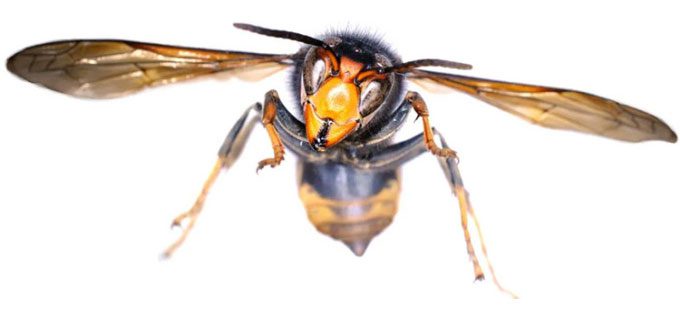According to genetic analysis, the entire population of Asian hornets invading Europe today may be descendants of a single queen from China.
Invasive species can spread quickly in unprepared ecosystems, causing significant damage. The Asian hornet (Vespa velutina), also known as the murder hornet, is no exception. They first appeared in Europe nearly 20 years ago and reached the UK in 2016. They expand their habitat by more than 80 km per year while hunting honeybees, flies, and other insects.

Asian hornet specimen collected in Dublin, Ireland. (Photo: Aidan O’Hanlon).
Through genetic analysis, a team of experts from University College Cork, Ireland, found that the rapid and widespread invasion of the Asian hornet in the West likely originates from a single wasp that moved from China to France in 2004, as reported by Science Alert on December 26. The new study has been published in the Journal of Hymenoptera.
Entomologist Eileen Dillane at University College Cork and her colleagues analyzed three genes collected when the Asian hornet first appeared in Ireland in April 2021. They then compared these with the gene sequences of hornets present across Europe. All were mitochondrial genes, which are passed down through generations.
“Previous studies indicated that Asian hornets in Europe share a common lineage, based on studies of a single gene. We took it a step further by examining two additional genes that are more sensitive in detecting variation in the invasive population,” Dillane explained.
The results showed that the maternal lineage in Dublin, Ireland, is also similar to the lineage in Europe. “Our study, along with studies from other groups, indicates that the entire population of Vespa velutina in Europe, which now may number in the millions, is descended from a single queen that arrived from China around 15 to 20 years ago,” the research team stated.
In Southeast Asia, the Asian hornet is a native species and hunts Asian honeybees. Asian honeybees have a complex alarm and defense system. They can trap hornets in a ball of bees, heating the attacker to death. However, European honeybees do not have such defense mechanisms and become easy targets for the Asian hornet. This raises concerns among experts about pollination activities in Europe.
The sting of the Asian hornet can cause allergic reactions in some individuals, but they are not aggressive toward humans, unlike European hornets. Dillane’s team believes that the extremely low genetic diversity in the European Asian hornet population could present potential for biological control. However, they also warn that climate change may increase the risk of successful invasions in the future, necessitating ongoing vigilance.


















































